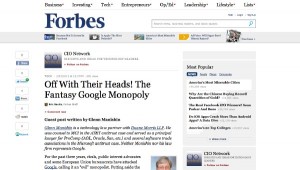For all the discussion, dead-on accurate, about law holding back technological innovation, sometimes it works the other way around. When industries are transformed by disruptive new technologies and business models, the law itself can be in for a game-changing, forced makeover.
Take the European Union (EU) and digital music. Everyone by now realizes that the introduction of portable MP3 music players, coupled with Apple’s pioneering iPods and iTunes music store, have revolutionized the market for distribution of recorded music. Gone are the days of buying albums (or even CDs) just to get one hit song. Music is available on any device, in the cloud, streaming on desktops, and everywhere else, and it’s intensely personal playlists involved. As a result, the hockey stick adoption curve shows that hardly a decade after digital music downloads first gained popularity, “record stores” – Tower Records,
anyone? – are a thing of the past, record labels (EMI as the latest) appear to be on their last hurrahs, and fully 1/2 of all music
purchased in the United States is totally digital, never burned to a physical product.
 That has not been the case in the EU. Despite a standard of living in excess of the US, less than 20% of music sold in Europe is digital. That’s in part because, under the EU Treaty, copyright licensing is conducted on a member state basis. This “balkanization” of the law (pun intended) means that digital sellers in the EU need to negotiate separate deals with each label and for each country, from France to the Czech Republic to Turkey, under very different legal regimes. That’s obviously a recipe for increasing costs and timeframes for entry, bad for business and keeping new distribution models from consumers.
That has not been the case in the EU. Despite a standard of living in excess of the US, less than 20% of music sold in Europe is digital. That’s in part because, under the EU Treaty, copyright licensing is conducted on a member state basis. This “balkanization” of the law (pun intended) means that digital sellers in the EU need to negotiate separate deals with each label and for each country, from France to the Czech Republic to Turkey, under very different legal regimes. That’s obviously a recipe for increasing costs and timeframes for entry, bad for business and keeping new distribution models from consumers.
In response, the EU Commission used its competition powers a couple of years ago to harmonize copyright laws in order to make them consistent throughout the EU, aimed at breaking down national barriers in the digital music business and making it possible for rights holders to issue pan-European licenses. As one can observe from a similar step towards telecom “liberalisation” in the ‘00s, however, that itself requires a vigilant enforcer at the EU level to ensure that parochial national legislatures and courts do not slow roll the process. This 2008 licensing change helped Apple launch its iTunes music store in all 27 European nations, but so far no one else. In 2009, major members of the online music industry — including
Amazon, iTunes, EMI, Nokia, PRS for Music, Universal, and others — signed a pact with the European Commission to work towards wider music distribution in Europe.
Yet Apple remains the only digital music seller with licenses to operate in every EU country. And even then, Apple rolled out iTunes stores in Poland, Hungary and 10 other European countries just last year, seven full years after arriving in Germany, the UK and France. As ArsTechnica comments:
Unlike the US, online music in Europe is typically only sold through one country’s stores at a time — this is despite the EU’s efforts to effectively eliminate the borders of its 27-country membership when it comes to products and services. As such, if you’re in Spain and want to buy a song from France’s iTunes store, you can’t — the store blocks you from making the purchase because you aren’t in France. This has led to companies like Apple rolling out individual music stores for each European country with a large enough market, but the fragmentation has caused nothing but headaches for end users who just want to listen to their favorite music.
Finally—One iTunes Store to Rule Them All (in Europe).
The reality is therefore that the “single market” for intellectual property rights (IPR) contemplated in the EU’s 2011 report is far from ready to roll. As Neelie Kroes, who once took on Microsoft and now serves as the EU’s Vice President, asked rhetorically in ’08, “Why is it possible to buy a CD from an online retailer and have it shipped to anywhere in Europe, but it is not possible to buy the same music, by the same artist, as an electronic download with similar ease?”
So this week the EU is going a step further. Singling out “collecting societies” – European analogs to ASCAP and BMI which gather royalties of about €6 billion, or $7.5 billion, annually from radio stations, restaurants, bars and other music users and distribute the proceeds to authors, composers and other rights holders – the EU plans to push towards a directive requiring greater efficiency, transparency and reciprocity. Royalty-collection societies could be forced under the draft rules to transfer their revenue-gathering activities to rivals if they lack the technical capacity to license music to Internet services in multiple countries. The idea seems to be that if it cannot reduce the sheer number (some 250) of collecting societies, at least the European Commission can make sure they operate as much in unison as possible.
A lesson to be drawn from this ongoing saga is that just as technical innovation can disintermediate industries and eliminate arbitrage as an economic profit motive among different markets, so too can it work to force elimination of legal differences among jurisdictions. Especially where the medium is the Internet, inherently global and regulated by no one (unless the European-centric International Telecommunications Union has its way), these legal changes can occur very quickly. Believe it or not, the four years over which the EU has been working for digital copyright licensing harmonization is lightning pace for the law.
Note: Originally prepared for and reposted with permission of the Disruptive Competition Project.



